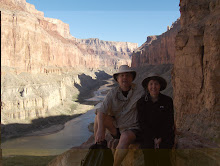Tasting procedure
Here's a quick outline on the way I evaluate wine:
1) I take every effort NOT to know the price of the wine I'm tasting.
I feel that knowing the price influences the way I assess the wine. For instance, if I know a wine cost $45 wholesale, I'm expecting a complex wine with a certain level of balance and depth, whereas if it costs $7 wholesale, I have different expectations.
I've found that I'm more frequently surprised when I don't know the price beforehand.
2) When tasting, above all, I look for balance. You could have a focused German Riesling that on first glance seems simple , but reeks of purity, or a lush, rich American Cab with a broad range of flavors. However, it doesn't matter how good the individual components are if the wine is unbalanced.
3) Rather than rate the wine on a point system, whether it's 100 points, or 5 stars, and totally subjective I might add, I ask myself "What's the most I'd be happy paying for this wine?"
I then note that price as ...um... let's call it a "value factor".
I've found that, although still subjective, it's much more practical in determining whether or not a wine is a good purchase.
For instance, if I think I'd be happy paying $60-$70 for a wine (This is where I rate many $100+ wines), and the wine costs more than that amount, I'd seriously consider other factors before purchasing the wine. Similarly, if I can buy that wine for $20 a bottle, I'd go out and stock up on that wine.
As a young wine buyer under the instructions of "never buy anything the day you taste it", I can't tell you how many times a broker or distributor would contact me a week after I'd tasted one of their wines, inquiring whether I was still interested, and I'd check my notes and say, "Yeah, I really liked that wine!" Then they'd tell me the wholesale cost, and I'd find myself in a quandary, asking "Can I sell that wine for $70?"
This "dollar" system I devised took all of the guesswork out of whether I consider it a good buy.
4) General facts about my tasting experiences:
- There are probably less than 10 wines that I've ever deemed worth in excess of $100. (I can't just throw money around, y'know).
- Most of the better wines I've tasted fall within $70-$80 range.
- I've had the opportunity to taste all of the "best wines", including Gaja, Ch Petrus, Screaming Eagle, Harlan Estate, DRC, and all of the first-growth Bordeaux, just to name a few.
- These are just MY opinions. You should use ALL reviews, including mine, as a guide to help you decide what is the best purchase for you. If you find that you have similar tasting experiences with someone else, those are the people you should turn to for your buying advice.
This holds true whether it's me, a writer for a major publication, or the guy in the next cubicle.
Everyone's likes and dislikes are different.
As for me, I like brussel sprouts, but hate liver, and if I had only two wines to drink for the rest of my life, they'd be Zinfandel and Amarone. (At least this week, anyway...)
...and last, but not least, until you've found someone you trust to tell you what to buy; buy one or two bottles of a recommended wine and see what YOU think. After all, you can't drink ratings, and if it doesn't taste good to you, it's not worth any price.
Cheers,
Chuck


0 Comments:
Post a Comment
Subscribe to Post Comments [Atom]
<< Home